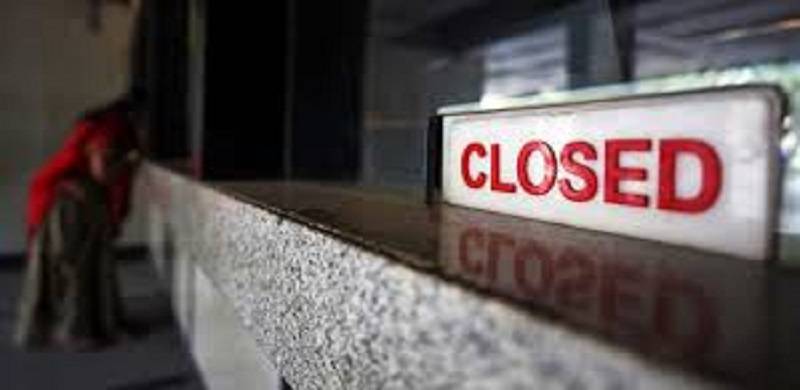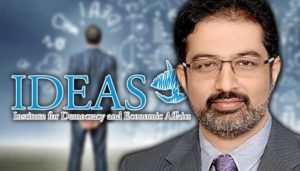
Sabiha Shaheen describes living life in the time of corona. She interviews three people who are executive directors of civil society organisation, about their personal observation and assumptions about the pandemic.
The lives of people such as me (and Gulmina Bilal, Muhammad Waseem and Ali Salman) are thrilling yet a difficulty. We tend to think quickly, act fast, grab opportunities, and adjust things according to the needs of the time that we’re in. We’re very much ready to make compromises in our personal lives. We’re workaholics, early sleepers and risers. We’re quite particular about maintaining a healthy lifestyle.
This life may seem boring for others but this is just how we are. We don’t attempt to maintain healthy lifestyles; it just happens. The only thing our lives is geared towards is achieving our work ambitions and fulfilling our dreams.
Now what are these types of people, who gear their every waking moment towards their work and who don’t care about anything besides their work, doing right now, in a time under the COVID-19 where working is not a possibility?
This was the key question that I explored and start with own-self.
Well, when the news of an immediate quarantine was dispersed throughout the country; along with it came anxiety which filled my mind and body.
Then I thought on it and gave myself hope, convincing myself that it would only last for a week or so and life would go back to normal.
I spent the first week being restless and anxious and just counted the days down. When it extended for another two weeks, I started planning as to what I’ll do to cope. I started planning interesting things: how I could shift my work to the digital space. How I could engage myself and get something productive out of it. It took a few days to plan and start working again but with the belief that it would all be over soon.
I’ve started getting results from my online work and I am now at least sure that the work has not stopped. I’m online 24/7. I’ve started giving importance to things like zoom meeting packages, instagram accounts, Facebook lives, Twitter trends; things I never thought I’d focus this much on. I’m quickly learning how to maximise the digital space for my work; just similarly how I had learnt to maximise previous spaces like person to person space, group discussions, conferences, festivals, trainings, etc.
On personal level I have done amazing things and had great time with my family. We go for walk every day and had wonderful conversation. We explored our society and came to know that we are living in a beautiful colony which we never realised. We have dinners together at our terrace. We watched movies, tele-shows etc. I got to know first time after 17 years of my married life that my hubby likes extremely hot tea. My younger sister cooked amazing food for us. We now have themed dinners and breakfasts like French breakfasts, Mediterranean cuisine and Sri Lankan dinners. She is an amazing chef.
Having presenting my own situation, I was also curious how other colleagues in positions of executive directors in the civil society are coping with their professional lives during the CVID-19 days. I interviewed and could gather statements from three other colleagues.
Gulmina Bilal Ahmed is Executive Director of Individualland, which is a research based consultancy and advocacy group. She says:
“When I initially heard about quarantine, I got excited. I was relaxed. I thought it would be a good opportunity as a break to get smart solutions. We as family enjoyed this time too. We started daily evening walks. We started enjoying eachothers’ jokes, which we never did before. At office, we were already using online spaces. But for the first time we reached out to our beneficiaries online. We maximized it. We started team-building exercises online. Now the lockdown is taking more and more time, nobody knows how long it will go? I feel depressed to think that I won’t be able to meet my family (mother and siblings) on Eid day.

It seems to me as if I was on a treadmill, running fast and suddenly (with COVID-19) the treadmill stopped and I can’t get down. It is scary that we can’t plan our life. We don’t know when it will be over. I am planning to go to a resort if it is going long. Atleast we will have different environment, area and people around us.
Muhammad Waseem is executive director of Interactive Resource Center (IRC) a media organization based in Lahore. His response was:
When I heard about quarantine, immediately I thought: “phas gey”. But I really enjoyed first week of quarantine; watching movies and exploring my own home. It was interesting that I had erstwhile no time to look around my own home. I explored it during the quarantine the way I hadn’t. For example, I saw different parts of the house for the first time and have good ideas of how best we can use them. I have also started doing house chores for which my wife used to call plumbers and other handymen.
Second week of the quarantine was quite boring. My organization is already into using digital space because most of our work is online. But the quarantine has prompted me to reflect more and think through innovative ideas. Because of the lockdown, our media production company is financially loosing. We were providing services to media groups which are at halt now. I think that we will have to adjust with the Corona virus reality. It is a new normal at least for the time being. We will have to amend objectives of our work and think about new spectrum according to the new situation. I feel we have no other option other than to accept it.”
Ali Salman is CEO of Institute for Democracy and Economic Affairs (IDEAS) Malaysia and CEO of Islam and Liberty Network and also runs an Islamabad-based think tank PRIME INSTITUTE. While informing about his days of the CIVID-19, he told: “I was shocked initially to know about lockdown because it was on such a short notice. I had to plan how to do virtual meetings and how we would convert our work online. But interestingly I managed everything and successfully executed four webinars which was otherwise difficult.

Our regular work as a Think Tank needs not much physical presence apart from seminars and communication activities. In that sense, the COVID-19 didn’t drastically affect our work. Nevertheless, I can see an enforced discipline in my team regarding time, activities and outputs. We are more productive now. I have been more creativity because I got time to reflect. On personal level, I found many new things to do in Post COVID-19. I spend greater time with my family and in kitchen with my wife. I baked pizza which I never did before.
I dedicated one whole Sunday to kitchen and prepared all three meals which could not have happened in pre- corona times. I realized the value of work that my wife Dr Shagufta does every day. I am more grateful now for her support. I, however, feel privileged that we are managing things and getting results online in work but if the lockdown continues for six months then it will be problematic.”
The lives of people such as me (and Gulmina Bilal, Muhammad Waseem and Ali Salman) are thrilling yet a difficulty. We tend to think quickly, act fast, grab opportunities, and adjust things according to the needs of the time that we’re in. We’re very much ready to make compromises in our personal lives. We’re workaholics, early sleepers and risers. We’re quite particular about maintaining a healthy lifestyle.
This life may seem boring for others but this is just how we are. We don’t attempt to maintain healthy lifestyles; it just happens. The only thing our lives is geared towards is achieving our work ambitions and fulfilling our dreams.
Now what are these types of people, who gear their every waking moment towards their work and who don’t care about anything besides their work, doing right now, in a time under the COVID-19 where working is not a possibility?
This was the key question that I explored and start with own-self.
Well, when the news of an immediate quarantine was dispersed throughout the country; along with it came anxiety which filled my mind and body.
Then I thought on it and gave myself hope, convincing myself that it would only last for a week or so and life would go back to normal.
I spent the first week being restless and anxious and just counted the days down. When it extended for another two weeks, I started planning as to what I’ll do to cope. I started planning interesting things: how I could shift my work to the digital space. How I could engage myself and get something productive out of it. It took a few days to plan and start working again but with the belief that it would all be over soon.
I’ve started getting results from my online work and I am now at least sure that the work has not stopped. I’m online 24/7. I’ve started giving importance to things like zoom meeting packages, instagram accounts, Facebook lives, Twitter trends; things I never thought I’d focus this much on. I’m quickly learning how to maximise the digital space for my work; just similarly how I had learnt to maximise previous spaces like person to person space, group discussions, conferences, festivals, trainings, etc.
On personal level I have done amazing things and had great time with my family. We go for walk every day and had wonderful conversation. We explored our society and came to know that we are living in a beautiful colony which we never realised. We have dinners together at our terrace. We watched movies, tele-shows etc. I got to know first time after 17 years of my married life that my hubby likes extremely hot tea. My younger sister cooked amazing food for us. We now have themed dinners and breakfasts like French breakfasts, Mediterranean cuisine and Sri Lankan dinners. She is an amazing chef.
Having presenting my own situation, I was also curious how other colleagues in positions of executive directors in the civil society are coping with their professional lives during the CVID-19 days. I interviewed and could gather statements from three other colleagues.
Gulmina Bilal Ahmed is Executive Director of Individualland, which is a research based consultancy and advocacy group. She says:
“When I initially heard about quarantine, I got excited. I was relaxed. I thought it would be a good opportunity as a break to get smart solutions. We as family enjoyed this time too. We started daily evening walks. We started enjoying eachothers’ jokes, which we never did before. At office, we were already using online spaces. But for the first time we reached out to our beneficiaries online. We maximized it. We started team-building exercises online. Now the lockdown is taking more and more time, nobody knows how long it will go? I feel depressed to think that I won’t be able to meet my family (mother and siblings) on Eid day.

It seems to me as if I was on a treadmill, running fast and suddenly (with COVID-19) the treadmill stopped and I can’t get down. It is scary that we can’t plan our life. We don’t know when it will be over. I am planning to go to a resort if it is going long. Atleast we will have different environment, area and people around us.
Muhammad Waseem is executive director of Interactive Resource Center (IRC) a media organization based in Lahore. His response was:
When I heard about quarantine, immediately I thought: “phas gey”. But I really enjoyed first week of quarantine; watching movies and exploring my own home. It was interesting that I had erstwhile no time to look around my own home. I explored it during the quarantine the way I hadn’t. For example, I saw different parts of the house for the first time and have good ideas of how best we can use them. I have also started doing house chores for which my wife used to call plumbers and other handymen.
Second week of the quarantine was quite boring. My organization is already into using digital space because most of our work is online. But the quarantine has prompted me to reflect more and think through innovative ideas. Because of the lockdown, our media production company is financially loosing. We were providing services to media groups which are at halt now. I think that we will have to adjust with the Corona virus reality. It is a new normal at least for the time being. We will have to amend objectives of our work and think about new spectrum according to the new situation. I feel we have no other option other than to accept it.”
Ali Salman is CEO of Institute for Democracy and Economic Affairs (IDEAS) Malaysia and CEO of Islam and Liberty Network and also runs an Islamabad-based think tank PRIME INSTITUTE. While informing about his days of the CIVID-19, he told: “I was shocked initially to know about lockdown because it was on such a short notice. I had to plan how to do virtual meetings and how we would convert our work online. But interestingly I managed everything and successfully executed four webinars which was otherwise difficult.

Our regular work as a Think Tank needs not much physical presence apart from seminars and communication activities. In that sense, the COVID-19 didn’t drastically affect our work. Nevertheless, I can see an enforced discipline in my team regarding time, activities and outputs. We are more productive now. I have been more creativity because I got time to reflect. On personal level, I found many new things to do in Post COVID-19. I spend greater time with my family and in kitchen with my wife. I baked pizza which I never did before.
I dedicated one whole Sunday to kitchen and prepared all three meals which could not have happened in pre- corona times. I realized the value of work that my wife Dr Shagufta does every day. I am more grateful now for her support. I, however, feel privileged that we are managing things and getting results online in work but if the lockdown continues for six months then it will be problematic.”
